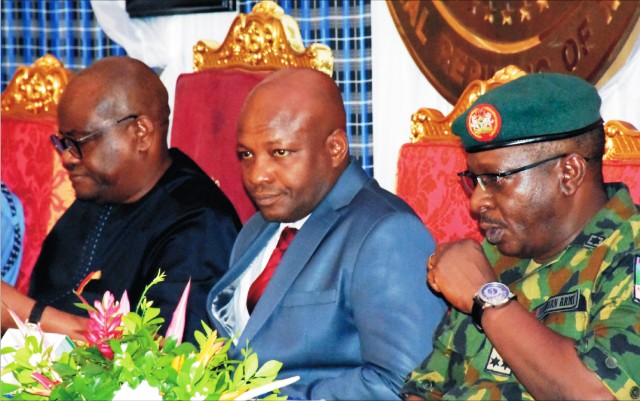The Bayelsa State Government has restated its commitment to developing the State-owned Bayelsa Medical University (BMU), to attain global acclaim in terms of scholarship, research excellence and production of quality human resources to address manpower shortage and healthcare delivery needs in the country
Deputy Governor of the State, Senator Lawrence Ewhrudjakpo, made this known while speaking as Special Guest of Honour at an event put together by the BMU to mark the first anniversary of its current Vice Chancellor, Prof. Dimie Ogoina, at the Main Campus of the u6niversity in Yenagoa.
A statement issued by the Senior Special Assistant on Media to the Deputy Governor, Mr Doubara Atasi, at the weekend, quoted him as saying that the present administration was irrevocably committed to the vision for the institution as enunciated by the former Governor and Founder of the University, Senator Seriake Dickson.
While commending the former Governor and now Senator representing the State’s West Senatorial District, Senator Dickson for his foresight in establishing the institution despite the stiff opposition, Senator Ewhrudjakpo expressed delight over the achievements the institution has recorded in its few years of existence.
He also applauded the pioneer Vice Chancellor of the BMU, Prof. Ebitimitula Etebu and his successor, Prof. Dimie Ogoina, for their commitment and efforts that have brought the university to where it is today.
The Deputy Governor noted that considering its standards and the progress being made by the university, the BMU would soon export Bayelsa to the world and attract the world to the state through academic excellence and record-breaking research findings.
Senator Ewhrudjakpo, however, stressed the need for the Management Team, staff, students and all critical stakeholders to work harder towards actualizing the vision and rationale behind the establishment of the specialized institution.
“Having thanked God, my next thanks go to Senator Henry Seriake Dickson for his painstaking efforts that led to the establishment of this very important institution. I’m commending him because I know the opposition he faced back then.
“He proved himself as a visionary leader when he held sway as governor of the state, and we have started seeing the benefits of his foresightedness. You know he was seeing his visions in the daytime and not at night.
“I say this with all sense of humility and duty, because if I leave here without commending Senator Dickson, then I would have failed in my duty as a responsible and forthright human being. I feel honoured and privileged to venerate his contributions to the success story of this medical university”, he said.
“I’m also happy for the immediate past Vice Chancellor, Professor Ebitimitula Etebu, who was able to give us a tip of the iceberg from the memory lane. We must commend Professor Etebu for the solid foundation he laid for BMU as a pioneer VC.
“But today, we’ve a Vice Chancellor who is now planting good seeds, and we believe that these seeds will grow and enable us to export this university to the world, and bring the world to this university.
“I can assure you that the government of His Excellency, Senator Douye Diri is fully ready and committed to working with you at all times. Because we believe, working together, we’re going to have a peaceful, dynamic, very elaborate and outstanding university that will be a global brand.
“But to achieve this, all of us, including students, the academia, staff, Senate and Council, must all have our hands in glove to support this agenda of ASPIRE that has been introduced by the present VC”, he added.
In his remarks, the Vice Chancellor of the BMU, Professor Dimie Ogoina, explained the components of the ASPIRE Agenda that serves as his guide in running the University, which includes Academic excellence, Sustainability, Partnership engagement, Innovation and technology, Research excellence, as well as Empowerment and welfare.
Professor Ogoina, who expressed gratitude to the state government for its unrelented support to the institution so far, also listed some achievements under his watch, such as securing a research grant of £1.2 million from Welcome Trust, and the establishment of Nigeria’s first university-based Virtual Reality(VR) /Artificial Intelligence (AI) Mixed Reality Studio.
According to Professor Ogoina, in 2026, the university would develop a five-year strategic development plan which would outline the medium and long-term goals of the institution, to transform it into a national centre of excellence.
He added that the Visitor to the University, Governor Douye Diri, had given his nod for the BMU to have its own teaching hospital, to be complemented by AI Robotic Teacher to adequately cater to the pedagogical needs of its students.
Speaking earlier, the Chairman of the Occasion, Prof. Tomori Oyewale, applauded successive governments in the state, particularly that of Dickson and Diri, for not abandoning the dream of the pioneer civilian administration of late Chief Diepreye Alamieyeseigha.
Goodwill messages were also delivered by the university’s Pro-Chancellor and Chairman of the Governing Council, Professor Tarilah Tebepah and the pioneer Vice Chancellor of the University, Professor Ebitimitula Etebu.
Highpoint of the ceremony was the unveiling of the BMU Advances in Medicine and Health Sciences Journal, and five Digital Apps of the university by the Deputy Governor, Senator Lawrence Ewhrudjakpo.







